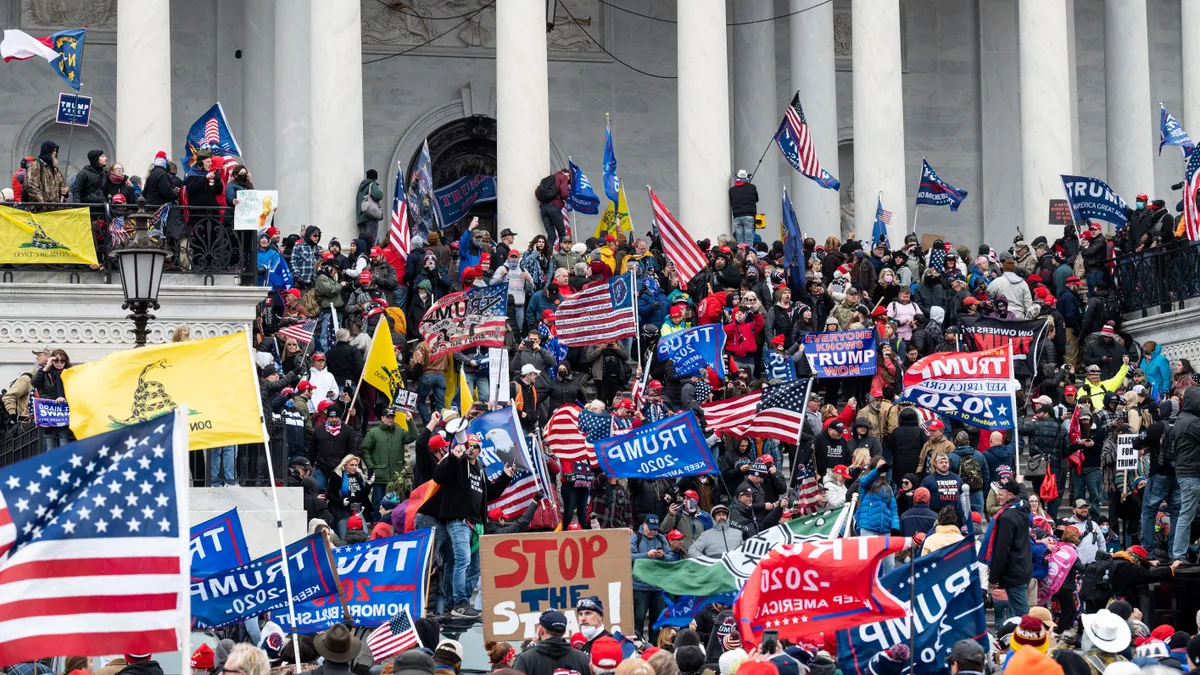Of all the trade groups that condemned the insurrection at the U.S. Capitol last week, perhaps most notable was one from the National Association of Manufacturers, which represents more than 14,000 employers. The organization minced no words, directly calling on Vice President Mike Pence to invoke the 25th Amendment and remove President Donald Trump from office.
Calling the day's events "despicable," North America’s Building Trades Unions President Sean McGarvey also called on Trump — and the lawmakers who objected to the Electoral College certification of President-elect Joe Biden — to step down.
Other industry groups such as the Associated General Contractors of America, Associated Builder and Contractors and the U.S. Chamber of Commerce also expressed strong disapproval of the day's events but stopped short of calling for the president's removal.
In addition, individual employers also began public termination of employees identified in photos and videos from the Capitol. At least 15 people who attended the rally have been fired or suspended from their jobs, or preemptively resigned amid growing outrage, according to The Washington Post.
One of them is 41-year-old laborer Doug Jensen of Des Moines, Iowa, who is facing federal charges after he was captured in photos and videos leading rioters up a staircase. Jensen’s boss, Dick Felice, who owns Forrest & Associate Masonry, said he terminated Jensen’s employment.
“He committed a crime as far as I’m concerned,” Felice told The Washington Post.
In addition, a marketing company in Maryland said it fired an employee who was shown inside the building wearing a company identification badge. The employer said it supports the exercise of free speech but could not tolerate "dangerous conduct that endangers the health and safety of others."
Corporate activism rising
It's a sea change from a time when employers tried to stay out of external matters, according to Maurice Schweitzer, a professor of management at the Wharton School of the University of Pennsylvania. "This is unprecedented. Companies and organizations are reacting far faster than ever," he told sister publication HR Dive via email.
Employees increasingly expect employers to take a stand on social issues, several recent surveys have revealed, and some have said they'll bypass companies that don't fit their values.
The accompanying rise in corporate activism has been happening for about 15 years, according to Schweitzer. Staff look to business leaders to "not only be managers of an organization but also to take a stand on political or moral issues," he said. That change was seen clearly during the 2020 protests for racial justice that followed the police killing of George Floyd.
Employers should prioritize supportive resources and transparency again now, Schweitzer said. Be transparent about the challenges at hand and promise to keep employees updated, he recommended.
It's also important to realize that individuals are likely already anxious about the pandemic, disconnected because of social distancing measures and feeling its economic effects, he noted.
Large companies, especially, may have to acknowledge they likely employ workers who support the president and who are upset that they will soon face a different reality. "It's a very anxious time for everybody and I think the political uncertainty has added to that," the professor said. "Employers should reach out because that anxiety is going to harm productivity."
It's likely Biden will ease the sense of uncertainty and crisis that Trump created, Schweitzer said, which may lessen pressure on employers. But there are clearly social justice issues that will remain important, he said, especially as the workforce becomes more mobile — a phenomenon the pandemic is expected to accelerate.
Employers will compete in increasingly large talent pools and workers will be able to choose employers that align with their values. This means a continued expectation that corporate leaders are committed to social responsibility, he said.
"This is an enduring trend that's going to continue," Schweitzer said.














